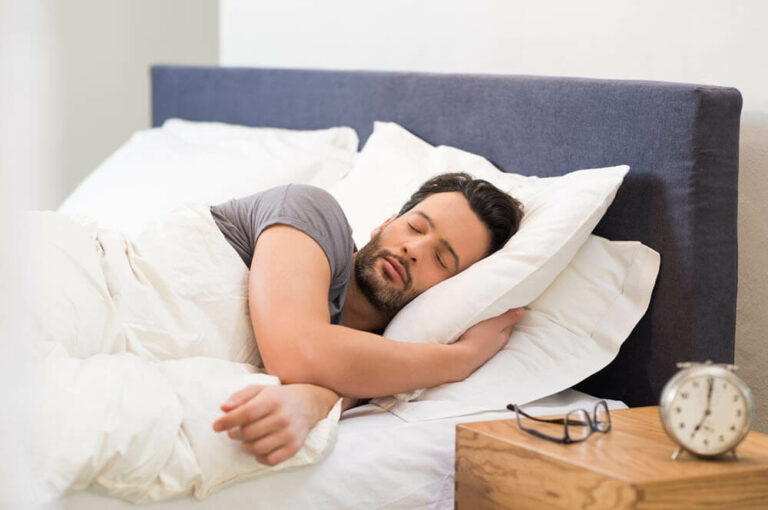While at first glance sleeping too much can seem like a good idea if you’ve missed out on the zzz’s lately, it’s actually anything but.
Can you get a headache from sleeping too much? Yes, you can. Oversleeping can in fact be as bad for your health as lack of sleep. On top of a host of health issues such as the risk for diabetes, heart disease, obesity, chronic pain, and fatigue, it could also cause drowsiness, excessive daytime sleepiness and yes, you’ve guessed it – headaches.
I’m sure most of you who read this right now have woken up with a morning headache, at least once in your life, and chances are, it happened after a particularly long night of sleep.
While this, of course, isn’t the only reason why you might end up with a headache when you least expect it – that is, after sleeping – it is quite a common reason nevertheless.
In this article, I’ll try to show you why this happens – why you get headaches after sleeping too much, and also about other potential reasons this might be happening. After that, we’ll take a look at how you can improve your sleep, how you can relieve your morning headache, and what you can do to prevent getting headaches when you wake up altogether.

What Do We Mean When We Say “Too Much Sleep?”
The amount of hours of quality sleep you need depends largely on your age, health conditions, your exercise routine, and genetics.
Generally speaking, though, scientists have agreed on the standard of 7-9 hours of sleep per night for adults over 18. This is also the consensus of the National Sleep Foundation (NSF), a big scientific authority on all matters of sleep.
Having this in mind, sleeping too much, i.e. oversleeping, is anything that is more than 9 hours of sleep per night.
Why Does Oversleeping Cause Headaches?
One of the most common side effects of oversleeping is headaches. Just as sleep deprivation can be detrimental to your health, so can oversleeping.
But why does this happen? Why do we get morning headaches after a binge sleep?
Well, it turns out there isn’t only one answer to that question. There are several causes behind your morning headaches, so let’s see just what these are.
You Have a Sleep Disorder

Sleep disorders, such as insomnia or sleep apnea, can cause a whole host of physical and mental issues, and headaches are definitely one of them.
This is largely because they interfere with the REM (rapid eye movement) phase of your sleep cycle, which is really, really important for getting good quality sleep and feeling rested in the morning.
Insomnia, for example, prevents your brain from slipping fully into REM sleep. And when you don’t have enough of this sleep phase, your body is likely to create specific proteins that stimulate your nervous system, and that, in turn, can also cause morning headaches.
Sleep apnea, the sleep disorder that causes breathing difficulties during sleep, reduces the amount of oxygen that enters your brain while you sleep. This also meddles with the REM sleep phase and limits blood flow in the brain, which again may cause headaches in the early morning, when you wake up.
You Have Mental Health Issues
Conditions that significantly affect your mental health, such as depression and anxiety, have strong links with chronic pain more specifically chronic headaches, such as migraine headaches, and overall higher sensitivity to pain.
What’s more, anxiety and depression, as well as a number of other disorders that affect mood and emotions (like PTSD, for example), can often cause sleep disorders such as insomnia and sleep deprivation, but they can also lead to oversleeping.

A study reported by Stanford magazine claims a strong connection between morning headaches anxiety and “depressive disorders,” a connection stronger than the one between chronic headaches and sleep disorders such as obstructive sleep apnea.
Additionally, stress can play a big role in the matter of morning headaches.
So, let’s say you’ve been pretty stressed lately, and you’ve just started to relax, but you notice a huge, pounding headache the next day – now, what’s that for?
Another US-led study about headaches, sleep, and rest claims that migraines and chronic headaches are more common in times when stress levels drop. In this event, migraines can emerge within the next 6, 12, or 18 hours.
Disruption of Serotonin Levels in the Brain
Oversleeping and changes in one’s sleep pattern can affect the levels of the neurotransmitter serotonin in the brain. This hormone and neurotransmitter plays a variety of roles in the body and is also responsible for a whole host of sleep-related processes, such as the regulation of your circadian rhythm, a.k.a. the internal clock that regulates your sleep and wake cycles, accordingly.
Serotonin helps your body figure out when it’s time to plug back in and plug out again, day in and day out.

However, when you have an irregular sleep schedule and when you consistently have poor sleep, you also wreak havoc on the plan and agenda of the neurotransmitters responsible for good quality sleep, such as serotonin.
You interrupt their daily work and cause what’s called “serotonin disruption.” So you keep on sleeping, sometimes even long after your serotonin helpers have signaled your brain ( the receptors) to wake you up. And even if you think you’re doing yourself a favor by continuing to sleep, you’re not really resting your body and mind. You’re doing yourself a disservice.
The narrowing of blood vessels caused by this serotonin disruption is what’s actually driving your morning headaches or your sleep-related headaches in general, even after prolonged napping (which is why you should always opt for a cat nap instead).
You’re Drinking Too Much Caffeine
Caffeine or alcohol and sleep don’t really pair well. Both of them are known to disrupt sleep patterns and long-term overuse results in poor sleep quality.
Caffeine is the most famous and most widely used legal stimulant on earth. I imagine most of us simply can’t begin the day without that first cup of joe early in the morning. Now, caffeine shouldn’t cause any significant sleep disruptions in the night for most people if you take it in the morning only. However, if you drink several cups of coffee a day, and especially more than 400mg or more than 600mg per day (the upper limit), then you definitely might be overusing caffeine, which may be causing problems with your sleep.

Even six hours after you consume a caffeinated drink, half of the caffeine is still in your body. For some people, it takes up to 10 hours for their bodies to clear caffeine completely from their system.
Okay, but what’s the deeper connection between caffeine and chronic headaches? Well, besides the effect on your sleep patterns, the disruption of which causes different types of headaches in the morning, it also has to do with caffeine withdrawal.
According to a very recent study, not only is “caffeine overuse” linked to the emergence of chronic migraines, but it is also the case that “sudden caffeine withdrawal may trigger migraine attacks.” According to this study, those who often suffer from migraines should limit caffeine intake to a maximum of 200 mg daily, and also make sure that they don’t cut it off abruptly, should they decide to quit.
Beware of Alcohol Overuse, as Well
Alcohol is another potential migraine trigger and morning headache culprit. This is because one of the effects of alcohol on the cardiovascular system is relaxing the blood vessels, which lets more blood flow into the brain. This is a very easy recipe for the emergence of headaches.
Also, alcohol reduces the time we take to fall asleep, reduces the REM sleep as well, but it increases the duration of deep sleep – in short, disturbs your sleep patterns and circadian rhythm, tricking your body and brain to keep sleeping even when you need to wake up.

Overuse of alcohol is also connected to the development of insomnia.
Both caffeine and alcohol can make you dehydrated, which is another reason why you may wake up with a pounding headache the next day.
You Have Bruxism
Sleep bruxism is a condition, usually caused by stress or anxiety, in which you unconsciously clench your jaw and grind your teeth during sleep. It can happen during sleep or while you’re awake as well, without you being aware of it. It can cause teeth issues, pain in the jaw, other facial pain, and headaches. If you’re doing this while you’re asleep, it can be the potential cause behind morning headaches.
Other Potential Common Causes of Morning Headaches
I talked about the most common causes that might be behind your early morning headaches. But there are plenty of other reasons out there that could be the culprits, instead. I won’t go into details about all of them, but here are some that you should also consider:
- Snoring
- Unhealthy diet, irregular meals
- Dehydration
- Tense neck and scalp muscles
Morning headaches don’t necessarily need to be a sign of a more serious issue. However, you should definitely see a medical professional under the following circumstances:
- If you have them often, and they don’t seem to go away even when you introduce some changes in your lifestyle and sleep hygiene;
- If they’re severe headaches;
- If they occur after you’ve suffered a head injury;
- If you notice any head pain accompanied by other symptoms like problems with vision, feeling confused and/or weak, feeling like you’re running out of air, and also brief loss of consciousness.
It’s good to be on the safe side and rule out any potentially serious medical conditions that might be causing it instead.
What to Do if You Wake Up With Morning Headaches
Sometimes, it takes a bit of time before the changes kick in to fully get rid of the morning headaches. And before that happens, there are ways to find relief if you wake up with one.

Take Medication
This can be an OTC painkiller that you usually use. It’s a good way to provide immediate relief for your throbbing pain in the morning, especially if you’re running late for work.
Drink Water
Drink water as soon as you wake up. Don’t reach out immediately for the coffee. Make sure you’re properly hydrated first. As we saw earlier, there’s a strong link between dehydration and headaches.
Rehydrating your body after sleep is something really important we often forget to do in the early morning. A good idea is to always keep a glass of water or a water bottle by your bed, on your nightstand for example, so you can have a sip in the middle of the night if you wake up thirsty, or first thing in the morning.
Do Stretching Exercises

This is recommended both for when you prepare to go to bed and when you wake up. In the case of morning headaches, focus on the neck and scalp area.
Stretching your neck muscles and gently massaging your scalp muscles are particularly helpful for tension-type headaches since these are usually caused by tension or contraction of the neck and scalp muscles.
Use Hot/Cold Compression or Have a Hot/Cold Shower
Whether you use hot or cold for your headaches depends largely on what types of headaches you have. Generally speaking, those that suffer from migraines usually like to use cold compression, cold packs, or cold showers.
However, those that suffer from tension-type headaches, or headaches caused by muscle contraction (of the neck and scalp) may benefit more from warm or hot compression/shower. Of course, in the end, it all depends on how your own body responds to the hot and cold difference. Experiment first and see what suits you best in alleviating headache pain.
Drink Tea

Not only will tea keep you hydrated, but it may also help relieve your headache. Make yourself some herbal tea instead of coffee in the morning. Ginger tea, chamomile tea, lavender tea, and peppermint tea are all great herbal remedies for headaches and also other types of body pain in general.
Try Aromatherapy
Alternatively, you can also try aromatherapy. Get yourself a diffuser in which you’ll put a few drops of peppermint oil or lavender oil and smell the magic – it’ll not only make your bedroom smell lovely in the morning, but it might also do something for those nagging headaches.
You can also use aromatherapy before going to bed as a means of relaxation and stress relief.
Try Breathing Exercises
Do some breathing exercises first thing in the morning. This gives your body more oxygen, so you’ll get a boost of much-needed energy in the morning. It will also help you relax your muscles.

Inhale through your nose, slowly. Take a deep breath. Make sure that your shoulders are relaxed, your back is not tensed, and that it’s also upright. Then exhale, again slowly, through the mouth. Repeat this for a couple of minutes, or 10-15 times, depending on how much time you have in the morning.
Stay a Little Longer in Bed
If you woke up suddenly with the alarm frantically buzzing, and you notice a throbbing pain in your head, then don’t get up immediately. Lie a little bit longer, or sit propped on your pillows and relax. Give yourself some time to properly wake up. Just remember, whatever you do, don’t fall asleep.
How Can You Prevent Morning Headaches All Together?
Okay, so we talked about how to relieve headaches. Now the next question I want to answer is how to actually prevent them from happening.
Now, you can’t just stop having headaches. It’s just a natural bodily response to a whole host of factors and circumstances, and oftentimes it’s nothing serious. It’s just your body’s way of telling you that you need to relax, have a meal, or drink more water.
But when it is connected to sleep, as in the case of oversleeping and morning headaches, there are some ways you can minimize their onset. The answer lies in the phrase “sleep hygiene,” which is very important for our overall health and keeping our circadian cycle healthy and in check.
Maintaining Good Sleep Hygiene
This is absolutely critical for any kind of sleep issues you might be having, including morning headaches or headaches after oversleeping.

What does good sleep hygiene mean exactly? Well, for one, it implies developing consistent sleep habits. Basically, you need to go to bed and wake up at the same time, every day. Yes, even on weekends (occasional slacking off is allowed, though).
Besides consistent sleep habits, you also need to get good quality sleep and a proper amount of sleep each night, which is 7-9 hours per night, as we already mentioned.
Make Changes in Lifestyle Habits
You need to lead a healthy lifestyle, hydrate more, avoid alcohol and caffeine, and of course, exercise – just don’t do it before you go to bed. Light stretching or bedtime yoga is okay, but don’t do cardio an hour or half an hour before you intend to fall asleep. It’s likely to be counterproductive.
Don’t forget to put a glass of water or a bottle of water by your bedside, so you can hydrate (a little bit) throughout the night and/or first thing in the morning.
Avoid Digital Devices at Night
Also, make sure to avoid digital devices an hour before you go to bed, since the blue light they emit will mess with your sleep. Turn off the lights (but leave the blinds open so the sun can wake you up in the morning), put on a white noise machine if you have one, and just relax, don’t start overanalyzing. Read a book, listen to a calming music playlist, write, or just rest your brain by staring at the ceiling and closing your eyes.

Give Your Body Time to Relax
Basically, the key is to give your body some time to prepare for going to bed. In these hyper-modern times we rarely get to do that, because we’re plagued by all sorts of distractions, both from the outside world, like entertainment and overworking, and also from inside of us, like overthinking and anxiety.
But if you can’t take the time to care for yourself, who can take it for you?
Better sleep significantly reduces the onset of morning headaches. All you need to do is stick to it for some time (usually for about a month) until your good sleeping habits become just that – a matter of habit.
FAQs
Does napping help headaches?
Research suggests that napping can help reduce headaches. A study from the University at Buffalo found that people with chronic daily headaches had decreased intensity and frequency of headaches when they took a nap in the afternoon. Napping also caused participants to feel better overall, so even if it does not directly relieve their headache symptoms, it will still make them feel more refreshed. Nonetheless, it is recommended to always consult with your doctor first before trying any treatment for headaches.
What are oversleeping symptoms?
Oversleeping symptoms may include feeling sluggish or disoriented when waking, having difficulty staying asleep at night, irritability or depression during the day, headaches, and aches and pains. People who oversleep may also be more forgetful or have difficulty concentrating during the day. Other symptoms include overeating and weight gain due to excessive daytime sleepiness, as well as frequent colds due to a weakened immune system. Finally, oversleeping can cause excessive fatigue: people who sleep for more than 10 hours a night are often so tired that they are unable to function normally throughout the day.
Why am I sleeping too much all of a sudden?
If you are sleeping too much all of a sudden, the most likely cause is an underlying health issue. It could range from something as simple as not getting enough exercise during the day to a more serious problem such as depression or anxiety. It can also be due to hormonal fluctuations that would affect sleep patterns and circadian rhythms, or it could be related to medication side effects. If sleeping too much persists, you should speak to your doctor about what potential causes might be driving this symptoms.
How to recover from sleeping too much?
Recovering from sleeping too much can be difficult, but there are some steps you can take to get back on track. First and foremost, try to stick to a regular sleep schedule as much as possible. Avoid taking long naps throughout the day or staying up late at night, as these will make it harder for your body to adjust. It is also important to exercise frequently and eat a healthy diet; both of these practices will help keep your energy levels up so that you don’t feel the need to excessively sleep. Additionally, minimizing stress by engaging in activities that bring you joy may also help reduce fatigue so that you don’t rely on excessive sleeping.
Can you get a headache from sleeping too little?
Yes, it is possible to get a headache from sleeping too little. Lack of sleep causes a variety of physical and mental health problems, including headaches. Poor quality of sleep can lead to impaired concentration, irritability, anxiety, and even depression. In addition to these issues, structural changes can occur in the brain due to inadequate sleep which results in pain associated with headaches. Furthermore, dehydration from lack of sufficient rest can cause further issues like hangovers or fatigue headaches as well.
Conclusion
Granted, good sleep hygiene might not solve headache problems for everyone, but it will significantly improve your sleep, which can’t hurt anyhow.
If you try all of the above and still don’t see any changes in the onset of your headaches, and you also notice other sleep issues, then don’t hesitate and talk to a doctor about it. You can make a headache diary listing all the times you get headaches and activities you did before that. Eventually, you’ll notice a pattern and identify your headache triggers.
They could uncover any underlying sleep disorders, mental health issues, or other types of health problems that might need immediate professional treatment. With this type of thing, it’s always the sooner the better, right?
But if it’s only a matter of fatigue and poor sleep quality caused by sleep deprivation that isn’t a result of a medical issue, then there’s nothing that a good night’s sleep can’t fix. Make that consecutive good nights’ sleep!
Article Sources
- Dosi, C., Figura, M., Ferri, R., & Bruni, O. (2015). Sleep and headache. Seminars in pediatric neurology 22(2):105-112. https://www.sciencedirect.com/science/article/abs/pii/S1071909115000285
- Lipton, R. B., Buse, D. C., Hall, C. B., et al., (2014, April 22). Reduction in perceived stress as a migraine trigger: testing the “let-down headache” hypothesis. Neurology, 82(16):1395-1401. https://pubmed.ncbi.nlm.nih.gov/24670889/
- Nowaczewska, M., Wiciński, M., & Kaźmierczak, W. (2020). The ambiguous role of caffeine in migraine headache: from trigger to treatment. Nutrients, 12(8):2259. https://www.ncbi.nlm.nih.gov/pmc/articles/PMC7468766/
- Stein, M. D., & Friedmann, P. D. (2006). Disturbed sleep and its relationship to alcohol use. Substance abuse, 26(1):1-13. https://www.ncbi.nlm.nih.gov/pmc/articles/PMC2775419/
- Brennan, K. C., & Charles, A. (2009). Sleep and headache. Seminars in neurology 29(4):406-418. https://www.thieme-connect.com/products/ejournals/abstract/10.1055/s-0029-1237113






